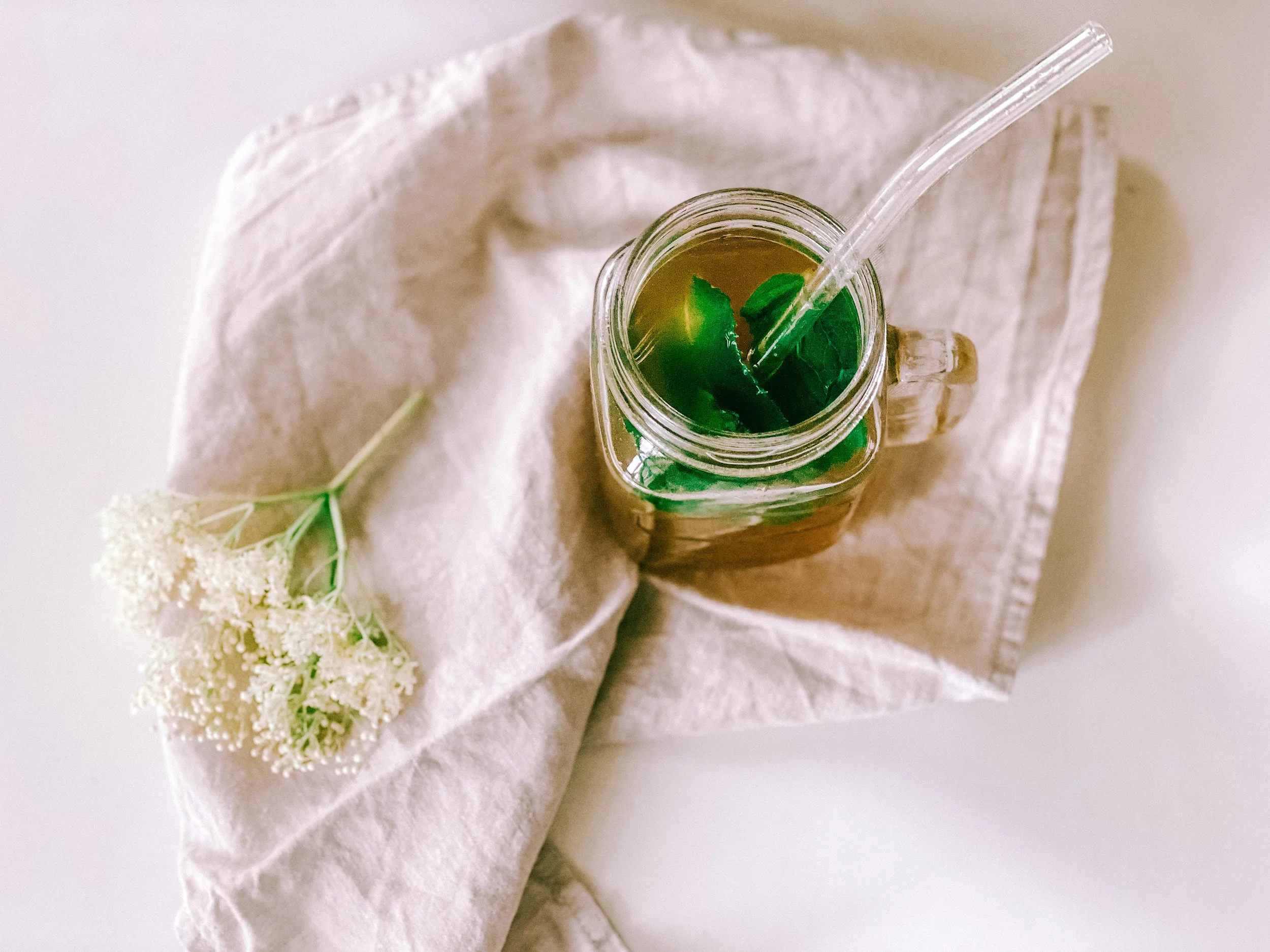Elderflower Syrup
Elderflowers (Sambucus nigra) are a beloved sight here in Austria, blooming in hedgerows and woodlands by mid to late May. Traditionally, they're turned into fragrant syrups that find their way into lemonades or sparkling alcoholic drinks. However, most commercial elderflower syrups are made with refined white sugar - something that doesn’t align with an Ayurvedic approach to nourishment.
So, I decided to make my own version using Ayurvedic sugar: raw, unrefined cane sugar, also known as jaggery (guda in Sanskrit). Jaggery retains the natural minerals of sugarcane and is considered a sattvic sweetener in Ayurveda - supportive of digestion, gentle on the system, and balancing for all three doshas when used mindfully.
Elderflowers themselves are more than just a beautiful bloom - they are a potent herbal ally. Native to Europe and North America, these delicate white blossoms carry a long tradition of healing. According to Ayurvedic principles, elderflowers have properties that:
Stimulate agni (digestive fire) and support metabolism
Promote lymphatic flow and natural detoxification
Act as a gentle diuretic, helping reduce excess fluid and ama (toxins)
Calm inflammation (anti-pitta), relieve pain (vedanāsthāpana), and fight bacterial infections
Support bowel movement due to their mild laxative effect
Are especially balancing for Vata and Pitta doshas, thanks to their cooling, moistening, and calming nature
When used fresh, their subtle, floral energy aligns beautifully with late spring and early summer, a transitional time when the body begins to shed the heaviness of winter and craves lighter, cleansing support.
When you harvest any kind of plant - it is an offering of the plant. but treat it with respect. Go slowly. Ask permission. Don’t take everything from the same place. Say thank you.
And here’s a quote I hold dear whenever I step into nature to gather its gifts:
"Know the ways of the ones who take care of you,
so that you may take care of them.
Introduce yourself.
Be accountable as the one who comes asking for life.
Ask permission before taking. Abide by the answer.
Never take the first. Never take the last.
Take only what you need.
Take only that which is given.
Never take more than half. Leave some for others.
Harvest in a way that minimizes harm.
Use it respectfully.
Never waste what you have taken,
Share.
Give thanks for what you have been given.
Give a gift, in reciprocity for what you have taken.
Sustain the ones who sustain you and the earth will
last forever."
-
Robin Wall Kimmerer
With harvest and setting time, it takes about three days to make. The effective “work” time is a lot less, about 15 minutes.
This recipe makes 3 medium-sized bottles of elderberry syrup.
INGREDIENTS
125 g (3,5 cups, or about 25 heads of) elderflowers (or more, the more the better)
3,2 cups (750 ml) water
1 kg dark, raw cane sugar (or syrup sugar if you like it traditional, tastes more of elderflowers that way)
Optional: 1 organic lemon or lime (go for lemons if you have a tendency to feel cold, go for limes if generally feel heated)
Optional: (mineral water) & a few mint leaves to garnish
INSTRUCTIONS
Harvest elderflowers responsibly, making sure to leave enough for nature. Gently shake the flower heads to remove any insects and check them carefully.
In a large pot, combine water and sugar. Heat gently, stirring until the sugar dissolves. Bring the mixture to a boil, then reduce the heat and let it simmer for about 15 minutes. You can add the washed and sliced lemons at this stage.
Let the mixture cool until it's lukewarm, then add the elderflowers.
To keep more of the natural vitamins, let the flowers steep in the syrup for at least 48 hours. Cover the pot with a lid or clean cloth to keep insects away - sugar attracts them easily.
When it’s ready, strain the syrup through a muslin cloth or fine sieve, and pour it into sterilized glass bottles.
If you want the syrup to last longer, you can bring the strained syrup to a boil and simmer it for about 3 minutes. Just keep in mind that this will reduce the vitamin content. Without heating, the syrup still keeps fairly well for a while.
The syrup shown in the photos was made with dark, raw cane sugar, which gives it a richer color and flavor. It’s a bit more nutritious too, though the taste is different - see what you prefer.
If you use refined white syrup sugar, just know that from an Ayurvedic perspective, it is very heating (Pitta aggravting), it will have a great taste but not the same effects as mentioned above. Keep that in mind or try both and compare how you feel.
Serve with (mineral) water, and some mint leaves for a refreshing touch.
Enjoy!



